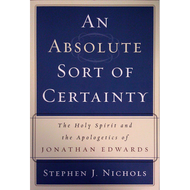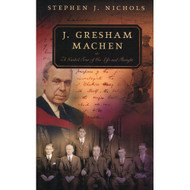Categories
Categories
What is Vocation? by Stephen J. Nichols (Booklet)
Product Description
Publisher's Description
For some people, work is tedious and boring—something to endure until the weekend arrives. For others, work is everything; it consumes them and their time. The former find no meaning or satisfaction in their jobs, the latter find too much—both lack an eternal perspective, a biblical framework through which they can evaluate what they spend most of their lives doing. This booklet offers that framework. Work, as ordained by God, has meaning and purpose. And by understanding your own vocation, you too can say with the psalmist, “Yes, establish the work of our hands!”
About the Author
Stephen J. Nichols (PhD, Westminster Theological Seminary) is president of Reformation Bible College and chief academic officer of Ligonier Ministries. He is also author of Jonathan Edwards: A Guided Tour of His Life and Thought and Martin Luther: A Guided Tour of his Life and Thought.
Endorsement
What is Vocation? This question is rarely asked anymore and Stephen J. Nichols laments this reality in the latest installment of the Basics of the Faith Series by Presbyterian and Reformed Publishing.
Nichols begins by alerting readers to the definition of vocation: "The English word vocation comes from the Latin word vocatio or, in the verb form, vocare. Its root means "calling." Early in church history most applied the word in an exclusive sense which was confined to church work. Others in medieval culture simply worked.
Luther gave new meaning to the idea of vocation and held that each person should embrace his or her calling - all to the glory of God (soli deo gloria). Nichols adds, "All work - all types of work, not just work done in the service of the church - was a calling."
Nichols points out that some evangelicals are still stuck in medieval culture by insisting that the idea of "calling" is limited exclusively to church, a trend that needs to be reversed if we are to embrace the biblical notion of vocation.
The next section includes a helpful discussion that develops a biblical and theological framework for work. The story begins in the garden where we come face to face with what theologians refer to as the cultural mandate (Gen. 1:26-28). Here we are called to have dominion over and subdue the earth.
The fall distorts the original intention in the creation mandate and the promised seed (protoevangelium) emerges in Genesis 3:15 where Christ "undoes what Adam did and reunites us to God and brings in the kingdom, the consummation of which is portrayed in Revelation 22:1-5."
Nichols takes a clear position on the whole idea of vocation as defined by the biblical plot line: "The biblical story line of creation, fall, and redemption - is the theological framework in which we begin to understand our purpose in life. It is also the context through which we understand work as vocation. Without it, work is just work - just putting in time."
The author includes a helpful section concerning rest which is the final component in the theological framework for the biblical idea of work or vocation. God presents the proper pattern of work and rest and he works for six days to create the universe and rests on the seventh. "We need to pay attention," Nichols writes, "to the boundaries that God has ordained for us. We need to be attuned to the healthy rhythms of work and rest."
Nichols discusses "how not to work" versus "how to work." In a discussion on Ephesians 6:5-9, he writes, "We are to render `service with a good will as to the Lord and not to man' (v. 7). This relates directly to calling. When work is understood as a calling, it is understood as a calling from God. He is ultimately the One we work for."
The author has done a fine job explaining vocation from a biblical perspective. He alerts the reader to the importance of doing everything to the glory of God. Highly recommended!
Nichols begins by alerting readers to the definition of vocation: "The English word vocation comes from the Latin word vocatio or, in the verb form, vocare. Its root means "calling." Early in church history most applied the word in an exclusive sense which was confined to church work. Others in medieval culture simply worked.
Luther gave new meaning to the idea of vocation and held that each person should embrace his or her calling - all to the glory of God (soli deo gloria). Nichols adds, "All work - all types of work, not just work done in the service of the church - was a calling."
Nichols points out that some evangelicals are still stuck in medieval culture by insisting that the idea of "calling" is limited exclusively to church, a trend that needs to be reversed if we are to embrace the biblical notion of vocation.
The next section includes a helpful discussion that develops a biblical and theological framework for work. The story begins in the garden where we come face to face with what theologians refer to as the cultural mandate (Gen. 1:26-28). Here we are called to have dominion over and subdue the earth.
The fall distorts the original intention in the creation mandate and the promised seed (protoevangelium) emerges in Genesis 3:15 where Christ "undoes what Adam did and reunites us to God and brings in the kingdom, the consummation of which is portrayed in Revelation 22:1-5."
Nichols takes a clear position on the whole idea of vocation as defined by the biblical plot line: "The biblical story line of creation, fall, and redemption - is the theological framework in which we begin to understand our purpose in life. It is also the context through which we understand work as vocation. Without it, work is just work - just putting in time."
The author includes a helpful section concerning rest which is the final component in the theological framework for the biblical idea of work or vocation. God presents the proper pattern of work and rest and he works for six days to create the universe and rests on the seventh. "We need to pay attention," Nichols writes, "to the boundaries that God has ordained for us. We need to be attuned to the healthy rhythms of work and rest."
Nichols discusses "how not to work" versus "how to work." In a discussion on Ephesians 6:5-9, he writes, "We are to render `service with a good will as to the Lord and not to man' (v. 7). This relates directly to calling. When work is understood as a calling, it is understood as a calling from God. He is ultimately the One we work for."
The author has done a fine job explaining vocation from a biblical perspective. He alerts the reader to the importance of doing everything to the glory of God. Highly recommended!
 Loading... Please wait...
Loading... Please wait... 









